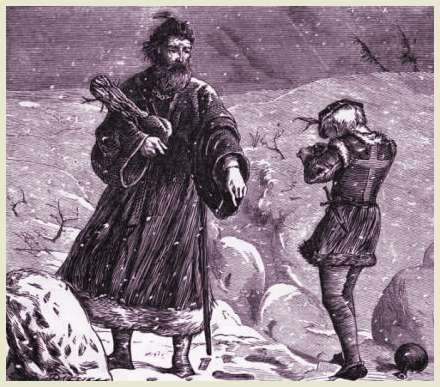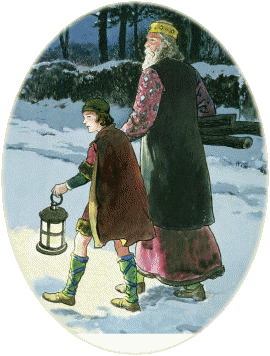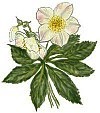HOME | home
The Holly and the Ivy | Cherry Tree Carol | Sans Day Carol | Gloucestershire Wassail | Seven Joys of Mary | Christ Child's Lullaby | Carol of the Beasts | Boar's Head Carol | I Saw Three Ships | Deck The Halls | Bleak Midwinter | There Is No Rose | King Jesus Hath a Garden | Baloo Lammy | O Come, O Come Emmanuel | The Carnal and the Crane | Hark the Harald Angels Sing | Straw Against the Chill | Good King Wenceslas | The Huron Carol | Shepherds Arise | The Shepherd's Carol | I Wonder as I Wander
Good King Wenceslas
The lyrics are by John Mason Neale, Warden of Sackville College, East Grinstead, Sussex (1818–1866)

Good King Wenceslas looked out
On the feast of Stephen
When the snow lay round about
Deep and crisp and even
Brightly shone the moon that night
Though the frost was cruel
When a poor man came in sight
Gath'ring winter fuel
"Hither, page, and stand by me
If thou know'st it, telling
Yonder peasant, who is he?
Where and what his dwelling?"
"Sire, he lives a good league hence
Underneath the mountain
Right against the forest fence
By Saint Agnes' fountain."
"Bring me flesh and bring me wine
Bring me pine logs hither
Thou and I will see him dine
When we bear him thither."
Page and monarch forth they went
Forth they went together
Through the rude wind's wild lament
And the bitter weather
"Sire, the night is darker now
And the wind blows stronger
Fails my heart, I know not how,
I can go no longer."
"Mark my footsteps, my good page
Tread thou in them boldly
Thou shalt find the winter's rage
Freeze thy blood less coldly."
In his master's steps he trod
Where the snow lay dinted
Heat was in the very sod
Which the Saint had printed
Therefore, Christian men, be sure
Wealth or rank possessing
Ye who now will bless the poor
Shall yourselves find blessing .

Yes, there really was a ruler named Wenceslas. It was not a king, but instead a duke of Bohemia in the tenth century, and his name in Czech was actually Vaclav. On the other hand, the description of him as "good" is completely justified. He was noted for his piety and devotion to the strengthening of Christianity in Bohemia. The legend is of King Wenceslas an old one, but its power is such that it has persisted for more than a millennium. Considered a martyr and a saint immediately after his death, a cult of Václav grew up in Bohemia, and also in England. Within a few decades of Václav's death four biographies of him were in circulation.These hagiographies had a powerful influence on the High Middle Ages conceptualization of the ‘’rex justus’’, or “righteous king”—that is, a monarch whose power originates not merely from the unconditioned Divine Right of Kings, but which stems mainly from his great piety, as well as from his princely vigor. The Feast Day of St. Stephen is December 26.
The lyrics are by John Mason Neale,
Warden of Sackville College, East Grinstead, Sussex (1818–1866)


Great Art Treasures at
